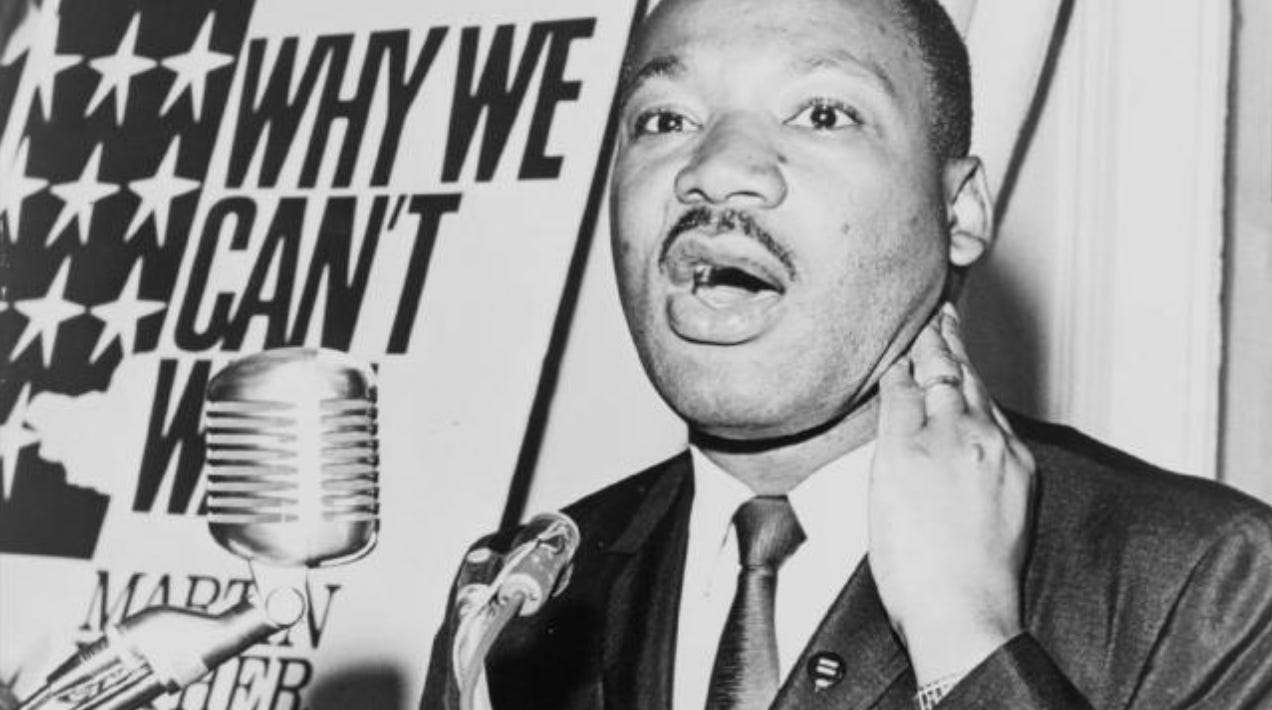In case you thought the script for 2025 wasn’t heavy handed enough, the Martin Luther King Jr. holiday falls on the same day that Donald Trump will be inaugurated.
The two men, of course, could not be any more different from one another.
King dedicated his life to combatting racism and bigotry, challenging the rich and powerful, seeking nonviolence and global peace, while Trump has embraced racism and bigotry as a path to his own wealth and power, encouraging his followers to commit violence for their cult and positioning the United States in new conflicts across the globe. (If you needed a clear illustration of how far apart these two are, remember that Donald Trump’s first appearance in national news came when the Nixon administration sued him for violating the Fair Housing Act of 1968, the non-discrimination measure that Congress passed specifically as a tribute to MLK after his assassination.)
Despite the unimaginably vast gap between what King stood for and what today’s MAGA minions stand for, we’re sure to see several Republican figures today do what they do every year — ignore the bulk of King’s massive body of speeches, sermons, articles and books to trot out the one partial quote they have twisted to meet their needs.
Look, I’ve already talked about this endlessly — for instance, when Republicans used the One True Quote to argue that MLK would have hated critical race theory when he was, quite clearly, an early champion of it — so feel free to reuse any of that when you find someone disingenuously insisting King would agree that today The Real Racism™ is what’s being directed against rich white people.
But beyond the usual conservative misappropriation of King’s dream of a world without racism, there’s a danger for all of us to fall into a similarly celebratory take on King’s life — one that doesn’t just celebrate all he accomplished, but one that pretends that we deserve to be celebrated too for accomplishing everything on his agenda.
There’s a simplistic version of MLK as the Black Messiah who took down the official systems of racial segregation and discrimination. He died for all our sins but now all our sins have been washed away clean.
That framing truncates the more complicated aspects of King’s work — especially the later years, when he was directly attacking what he decried as the twin evils of American imperialism and capitalism — and lets us all off the hook too.
But Martin Luther King Jr. wouldn’t want us to be complacent. He issued a lot of challenges to the people of this nation sixty years ago, and those challenges still lay there for us to take up.
You’re concerned about American foreign policy and its complicit role in fostering brutalities and genocides abroad? Listen to King on that.
You’re worried about women’s rights and reproductive freedoms? Listen to King on that.
You’re worried about the marginalized who have been left behind in our society? Listen to King on that:
Let us be dissatisfied until the tragic walls that separate the outer city of wealth and comfort from the inner city of poverty and despair shall be crushed by the battering rams of the forces of justice.
Let us be dissatisfied until those who live on the outskirts of hope are brought into the metropolis of daily security.
Let us be dissatisfied until slums are cast into the junk heaps of history, and every family will live in a decent, sanitary home.
Let us be dissatisfied until the dark yesterdays of segregated schools will be transformed into bright tomorrows of quality integrated education.
Let us be dissatisfied until integration is not seen as a problem but as an opportunity to participate in the beauty of diversity.
There’s a lot of King’s public activism in his later years that remains as relevant to our time as it was in his, and we should all do whatever we can to close the false distance between the past and the present, to ignore those who claim that every item on King’s agenda has been tackled, that we have nothing more we owe him, or owe ourselves.
If you need help bringing King’s life and lessons into this moment, let me do what historians love to do and recommend a book and a documentary. The book is Jeanne Theoharis’ new King of the North, which details MLK’s later years confronting the more complicated structural and system racism of America outside the South. And the documentary is the terrific King in the Wilderness, which tracks some of these same issues in the last year of his life.
As we remember King’s life and legacy — and contrast it with the life and legacy of the incoming president — let’s remember his fundamental challenge to us.
Let us be dissatisfied. And let us do something about it.





prophetic vision and courage to speak to power as he did, and to challenge us to imagine a better world and have the courage to take up that fight. good to hold close as the kleptocracy holds its Open House.
Regarding the One True Quote: even if King had not explicitly advocated affirmative action, it's absurd to read that quote as implicitly condemning it. If an advocate for the disabled said "Let us not be judged by the strength of our limbs, but by the strength of our character," would it follow the they were opposed to wheelchairs?